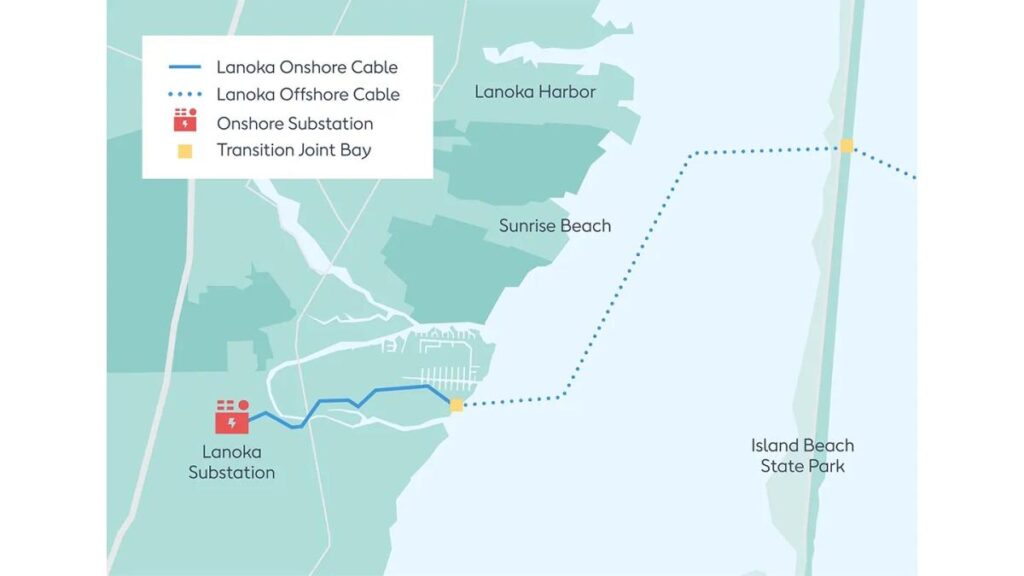(Ørsted/Ocean Wind One map)
Onshore construction for New Jersey’s first offshore wind farm kicked off in Lacey Township on Oct. 2, with work slated to continue at Island Beach State Park through next year.
The next steps include work to ultimately install copper and aluminum cables meant to connect with the electric grid at substations located at former power plants in Ocean and Cape May counties.
Work at the state park will run until May 2024 before taking a break until September so as not to disturb the summer tourism season, according to officials with Ørsted, the Danish energy developer.
NJ.com reported Oct. 6 that most of the cables, which Ørsted will begin installing at a parking lot near the beach park, will be buried except for overhead lines that will connect to both station sites. Construction of an onshore export cable in Lacey Township also will take place in stages through August 2024.
The first-ever construction for Ocean Wind 1 will bring the Jersey Shore ever closer to planned offshore construction for the project, something that would be a watershed in New Jersey’s ambitious clean energy goals.
The offshore work for the turbines is scheduled to begin between April and June of next year, according to a presentation by Ørsted during a virtual public information session Oct. 4.
A company spokesperson told NJ.com the next day that before offshore construction begins, Ocean Wind 1 needs final federal authorizations from the U.S. Army Corps of Engineers and the federal Environmental Protection Agency, as well as several state and local construction permits.
Ørsted officials said they were able to start the work after a construction and operations plan was approved by the federal Bureau of Ocean Energy Management (BOEM) in September.
Despite Some Objections, Project Has Key Backers
The proposed wind farm and others like it have been lauded by environmentalists, criticized by some, including local politicians, and is at the center of more than a year’s worth of controversy.
Some of the reasons for opposition, according to a Stockton University survey, included the unfounded scientific link between wind development and marine mammal deaths, as well as the worry that Jersey Shore views could be marred by turbine blades, and some public hesitation now that the project is closer to reality.
But New Jersey Gov. Phil Murphy has championed the project and Ørsted officials said they are mindful of various concerns as they begin the construction phase.
BOEM determined serious harm will not come to marine mammals as a result of the project, Ørsted reiterated Oct. 4. Federal regulations also require work stoppages under certain conditions and vessel speed restrictions to minimize effects on marine life.
Cable routes were chosen after consulting with federal agencies on where the “least impacts” on “marine users” would be, noted Katharine Perry, permit manager for Ocean Wind 1.
“We are required and will be establishing a compensatory mitigation fund to offset the loss of any impact that the project could have on the fishing industry,” she told NJ.com.
Ocean Wind 1 Could Power a Half-Million Homes
Project managers with Ørsted said Shore Road next to Island Beach State Park will remain open during the work, although limited to one lane by a construction zone.
Additionally, fences will be installed around the property, steel plates will cover the streetscape when workers are not on-site, and overnight guards will be stationed at the site. Parts of the road and parking lot will be restored if damaged during the cable installation.
Ocean Wind 1, one of at least two New Jersey projects Ørsted is currently building, will include as many as 98 offshore wind turbines set to soar more than 850 ft. high, as well as three onshore substations. The offshore wind farm is planned for a leasing area about 15 miles from the coasts of Cape May and Atlantic counties.
When completed, Ocean Wind 1 will have the capacity to generate about 1,100 megawatts of clean energy — able to power roughly 500,000 homes and contributing to the state’s goal of producing 11,000 megawatts of usage by 2040.
Despite reports in August that Ørsted could walk away from Jersey Shore and East Coast development due to issues like the worsening supply chain and high interest rates, company officials said in a statement toward the end of September that while delayed about two years, Ocean Wind 1′s offshore turbines were on pace to be in commercial operation between 2025 and 2026.
Read the full article here

